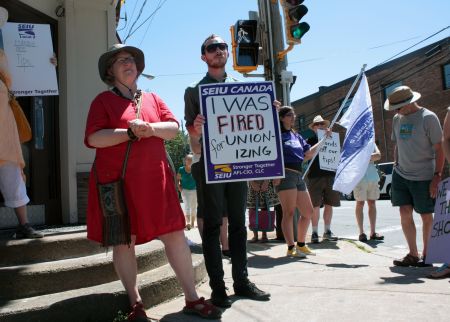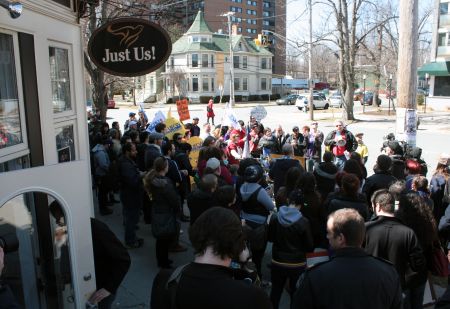About 40 people held signs outside the Quinpool Road Second Cup on Saturday. People of all ages attended the rally but the crowd was composed mostly of 20-somethings.
Jason Edwards, 27-year-old representative of the Service Employees International Union (SEIU), called out through a megaphone and the crowd responded:
“What do we want?”
“Jobs back!”
“When do we want it?”
“Now!”
The jobs were those of three baristas who allege Second Cup franchise owner Kathy Attis fired them after they attempted to unionize. A fourth barista was fired prior to the union vote, according to an SEIU complaint filed with the Labour Board last month.
Attis has declined to comment. She was not at the café Saturday.
The Labour Board hasn’t released results of the vote yet, but Edwards is confident the employees voted to unionize.
Second Cup HQ declined to comment on specifics, but said if the vote goes through, the Quinpool Road café would be the first unionized Second Cup franchise in Canada.
In Halifax, unionizing baristas is becoming a familiar story.
In March, two Just Us! employees were fired after they started a union drive. About 120 people rallied in front of the Spring Garden Road café in early April to protest the dismissals. The café has since recognized the union and re-hired the workers, but general manager Debra Moore maintains they were not fired for unionizing.
If you ask millenials at Just Us! and Second Cup, this sort of action comes naturally to their generation.
Born after 1980, they grew up hearing the false assumption that hard work and a post-secondary education would automatically lead to long-term, high-skill jobs.
Instead, they’re graduating with an average of $37,000 in debt nationally, and the odds stacked against them.
According to a 2012 report by Community Foundations Canada, one in three young Canadian workers are taking low-skill jobs after graduation. And, the report states, the national youth unemployment rate is double the national average—14.8 per cent compared to 7.2 per cent.
In the local market, millenials are competing, and losing, against the baby boomer generation for new jobs. The 2013 Halifax Index, produced by the Greater Halifax Partnership, found workers aged 45 and older made up 97 per cent of labour force growth between 2006 and 2012.
Due to a decline in pensions, boomers are less financially ready to retire, and are hanging onto jobs longer or leaving retirement.
Nova Scotia in particular is having trouble retaining young workers. The local 18- to 29-year-old population is expected to shrink by 25 per cent before 2031. According to Students NS chair Kyle Power, they’re leaving because they can’t find meaningful work.
The jobs that are available are lower-skill positions with no guarantee of long-term employment. Which brings us back to the service industry.
Millenials are stuck pulling espresso shots, and for some of them the logic goes like this: If you’re stuck in a low-skill, temporary job, you might as well make the most of it. And if unions offer workers respect and job stability, why not unionize?
Unions seen as a solution
On Saturday, 25-year-old Jude Kinder stood on the Quinpool Road sidewalk and read a statement through the megaphone: “I worked at this Second Cup since it opened and I was fired for unionizing.”
Kinder, who prefers the pronoun “they,” has five years of experience behind the espresso machine and began working at the Quinpool café in 2012.
Following the union vote on June 5, however, Attis allegedly cut Kinder’s shifts from 32 to 12 hours a week.
Kinder’s face appeared in a pro-union photo posted in the café prior to the vote. “I believe that made me a target, with the hours being cut,” they said.
On or around June 11, Kinder said Attis wrote them up for not wearing a uniform, though their shift wasn’t scheduled to start for 15 minutes. When Kinder refused to sign the written warning, they were allegedly fired.
“My co-workers need a voice at work,” Kinder said into the megaphone. “Our lives and our experience in the industry have value. The union needs to help us fight for the security and dignity that all workers deserve.”
When Kinder graduated in 2010, they had already worked in the café sector for two years. By keeping their grades “extremely high” and working in the service industry for 30 hours a week, Kinder managed to graduate debt-free.
Kinder believed attending university would lead to a decent-paying job. Instead, Kinder found a degree made them less employable.
After graduation, they searched for work to pay rent and bills. With a degree, Kinder said employers viewed them as over-educated and unwilling to stick with a job.
Kinder was unemployed for six months before Attis hired them at Second Cup.
Working there, Kinder felt fortunate to make enough to keep their head above water. They liked the job and decided to unionize in order to protect it.
“[Voting to unionize] wasn’t about wages per se, it was about job security. I wanted to know I would be able to pay my rent this month and next month.”
Kinder grew up in Dartmouth. They continue to live in HRM for the quirky lifestyle and great friends, despite the low wages and tough economy.
But it’s hard to stay.
“If I continue to find only minimum wage part-time work I’m going to have to leave, whether I want to or not,” Kinder said.
Staying in Halifax
The first year Shay Enxuga lived on his own, he got a job at Subway. He was 16.
Now 23, he has earned a living working in the service industry for the last seven years. He has served in restaurants, washed dishes and scooped ice cream.
Those who followed the recent Just Us! story may remember Enxuga—he was one of the café employees who was fired after attempting to form a union. He was reinstated after the union reached an agreement with café management.
As part of the settlement, however, he agreed not to talk about it.
In Enxuga’s experience, he’s one of the few millenials in the service industry without a university degree.
In 2012, after working on his undergrad for two years, he was accepted into Dalhousie’s Social Work Program. He declined.
He wanted to work in the non-profit sector, but after his friends received their diplomas, he noticed they were unable to find work in their fields.
“I just don’t think it makes sense for me get an undergraduate degree at this point.”
His entire life, Enxuga’s parents, teachers and the media told him to go to university and get a “good job,” he said. But the economic landscape has changed.
In his experience, as in Kinder’s, there aren’t enough decent-paying jobs for young people in Halifax. The majority of jobs available are food service jobs, which offer part-time work at minimum wage (plus tips, in most cases), with no benefits or job security.
“Most people my age in Halifax work in the food service industry—but not because we want to, because we have to. And I think that bosses and customers need to remember that the person pulling your espresso or flipping your burger is more than just a machine, that person is the future generation.”
Enxuga moved to Halifax in 2010 to go to school and figure out what he wanted to do in life. “I’ve stayed because I have fallen deeply in love with this city.”
Now, it’s home.
“I know that Nova Scotia has a poor economy and that certain opportunities aren’t available here, but instead of leaving I want to try and shift that.
“If I’m going to be working in food service, why not try and make those jobs better?”
If they catch on locally among millenials, unions may help to retain young people in Halifax. But it’s still too early to say.








